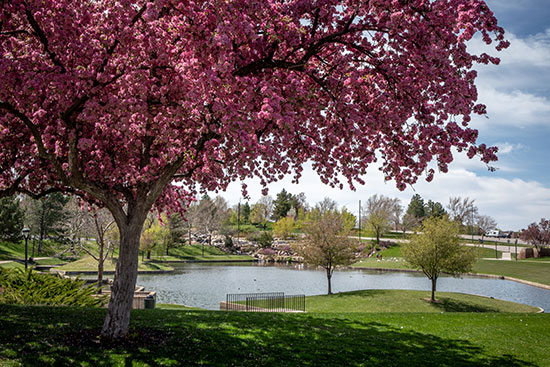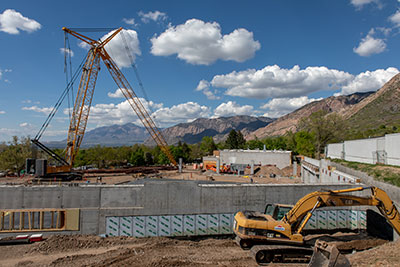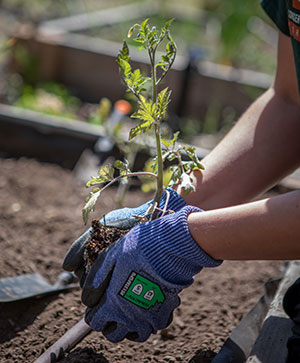Weber State Celebrates 52nd Annual Earth Day
OGDEN, Utah – Sustainability has always been a priority at Weber State University, and faculty, staff and students are working to ensure those efforts continue campuswide. April 22 marks the 52nd anniversary of Earth Day, and WSU is celebrating its ongoing sustainability efforts.
Sustainability Practices and Research Center (SPARC) Director Alice Mulder said the actions of governments, businesses and communities around the world, including higher education institutions, are necessary to address climate change challenges.
 “These last two years of the pandemic have shown us that when people come together to address a common challenge, they can rise to the occasion and address the issue through adaptation, improved tools and the implementation of science-based solutions, and in the longer term, make the world a better place for all.”
“These last two years of the pandemic have shown us that when people come together to address a common challenge, they can rise to the occasion and address the issue through adaptation, improved tools and the implementation of science-based solutions, and in the longer term, make the world a better place for all.”
New and Ongoing Sustainability Efforts:
Carbon Neutral Goal
In 2007, Weber State set its goal of becoming carbon neutral by 2050. Since then, the university has reduced its electricity consumption by 37%, natural gas consumption by 48% and total greenhouse gas emissions by 63%. In the process, WSU has saved more than $18.5 million in energy costs in the last 12 years, and over $7,500 on water costs in fiscal year 2021. This has all been accomplished while adding 697,800 square feet in new and renovated buildings to the WSU campuses. The university is set to reach carbon neutrality, 10 years ahead of the original goal.
Sustainability Summit Held Virtually
In March, WSU’s Intermountatin Sustainability Summit was held for the 13th year. The theme, “Reshaping Our Future,” allowed participants to explore ways to help solve climate and sustainability challenges and invited them to engage in innovative thinking for a sustainable and equitable future. The virtual event featured two keynote presentations and more than 55 locally and nationally renowned speakers.
Worldwide Climate and Justice Teach-In
At the end of March, Weber State was one of three Utah institutions to participate in the Worldwide Climate /Justice Teach-In, a Solve Climate by 2030 Initiative. Initiated by the Graduate Programs in Sustainability at Bard College in New York, the goal was to engage 1,000 communities. The campus and broader community attended five sessions during the day, which featured more than one dozen faculty giving short presentations on climate change issues and solutions. Resources for including climate change topics in classes were also shared with faculty.
Campus-Wide Green Department Certification Program
WSU’s Green Department Certification Program engages more than 90 WSU campus offices and departments in various efforts to make the university more sustainable. Participants in the voluntary program assemble a “Green Team” and earn points by selecting from a wide range of sustainable strategies, such as reducing energy consumption, reducing waste and transitioning office purchases to environmentally friendly products. Points achieved determine certification at the bronze, silver, gold or green levels.
Ground Source Field
 The university has finished construction on its third ground-source field, which is designed to provide all of the heating and cooling energy for the new Noorda Building for Engineering, Applied Science & Technology, as well as provide supplemental energy to campus. The ground-source field runs water through 190 wells dug approximately 350-feet deep, taking advantage of the earth’s constant underground temperature. Weber State uses water to heat and cool buildings; thus, the pre-heated or pre-cooled water reduces energy costs, making it a key part of the university's carbon neutral strategy. The field will begin full operations in fall 2022.
The university has finished construction on its third ground-source field, which is designed to provide all of the heating and cooling energy for the new Noorda Building for Engineering, Applied Science & Technology, as well as provide supplemental energy to campus. The ground-source field runs water through 190 wells dug approximately 350-feet deep, taking advantage of the earth’s constant underground temperature. Weber State uses water to heat and cool buildings; thus, the pre-heated or pre-cooled water reduces energy costs, making it a key part of the university's carbon neutral strategy. The field will begin full operations in fall 2022.
Classrooms
During the year, faculty applied to have a sustainability attribute or “SUS” added to their course, indicating a focus or inclusion of sustainability content in some way. Over 70 classes now have the SUS attribute, representing disciplines from all colleges. The connection to sustainability across disciplines is evident in classes including anthropology, economics, physics, nursing, interior design, English, math and chemistry.
Empower Northern Utah Program
Last fall Weber State’s Empower Northern Utah program helped over 270 northern Utah households increase the energy efficiency of their homes. The program provided hundreds of discounted and no-cost smart thermostats and over 1,100 high-efficiency LED light bulbs at no cost. The program was designed to empower residents to lower their carbon emissions and utility bills through easy efficiency upgrades.
Water Conservation
In 2014, two professors and their students conducted a water awareness study across WSU's Ogden campus. Their findings showed that with Utah’s impending drought, Weber State’s water usage and practices needed more attention. This study led to the creation of a campus water conservation specialist, the implementation of new water practices and the formation of the Water Council, which worked with the specialist to write the Water Action Plan. Together, they set a goal to reduce campus water usage 30% by 2025. Weber State achieved the goal four years early by installing weather sensitive irrigation systems across campus, new toilets certified by the Environmental Protection Agency and using waterwise plants and xeriscaping to lower water usage. For more information, visit this link.
OGX Wildcat Shuttle
 To lower water use across Ogden campus, many areas that once utilized landscaping have been replaced with xeriscaping — a landscaping style that requires little to no irrigation. The biggest xeriscaping project to date is the OGX Wildcat Shuttle, which is set to begin operations in fall 2022 and will utilize over 90% xeriscaping and waterwise plants along the bus line.
To lower water use across Ogden campus, many areas that once utilized landscaping have been replaced with xeriscaping — a landscaping style that requires little to no irrigation. The biggest xeriscaping project to date is the OGX Wildcat Shuttle, which is set to begin operations in fall 2022 and will utilize over 90% xeriscaping and waterwise plants along the bus line.
Renewable Energy in Action
Additional completed renewable energy projects at Weber State include two ground source fields that help heat and cool campus, a 550 killowatt solar array covering an entire parking lot, and a seven-acre solar field that supplies the energy needs to the WSU Davis campus in Layton. These projects are a vital part of helping the university reach its carbon neutral goal.
In reflecting on the year, Mulder noted, “The international meetings on climate in December last year (COP 26) underscored the need for action from all sectors now. At Weber State, we are acting on our commitment to work toward sustainability and address climate change. We have found practical and economically beneficial pathways to meet our goal of carbon neutrality by 2040, a decade ahead of our original target date.”
Visit weber.edu/wsutoday for more news about Weber State University.
Kennedy Jones, Marketing & Communications
801-626-7948 • kennedyjones1@weber.edu- Contact:
Alice Mulder, Sustainability Practices and Research Center director
801-626-6198 • amulder@weber.edu